 To enhance service speed and avoid tariff delays, we've opened a US warehouse. All US orders ship directly from our US facility.
To enhance service speed and avoid tariff delays, we've opened a US warehouse. All US orders ship directly from our US facility.
| Cat. No. | Product Name | Field of Application | Chemical Structure |
|---|---|---|---|
| DC23475 | W146 Featured |
W146 is a potent, selective S1P1 antagonist with Ki of 18 nM, displays no effect at S1P2, S1P3 or S1P5, enhances capillary leakage and restores lymphocyte egress in vivo. .
More description
|
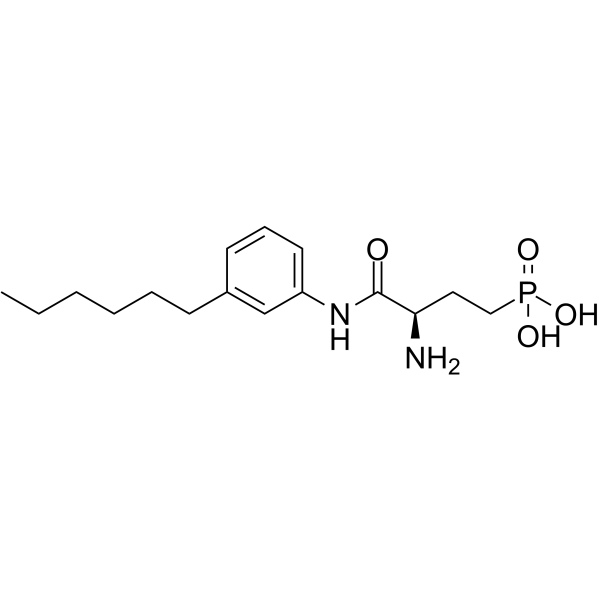
|
| DC74198 | TMX-4102 Featured |
TMX-4102 (TMX4102) is a highly potent, selective PIP4K2C binder with KD of 0.45 nM, shows no affinity for PIP4K2B and PIP4K2A (KD>10 uM).
More description
|

|
| DC31957 | Emeramide Featured |
Emeramide, also known as NBMI, BDTH2 or N,N'-Bis(2-mercaptoethyl)isophthalamide, is a mercury/heavy metal chelator. Emeramide molecule consists of two thiol groups and linked via a pair of amide groups. NBMI can be used to chelate heavy metals like lead, cadmium, copper, manganese, zinc, iron, and mercury from ground water, coal tailings, gold ore, waste water of battery-recycling plants, and contaminated soil.
More description
|
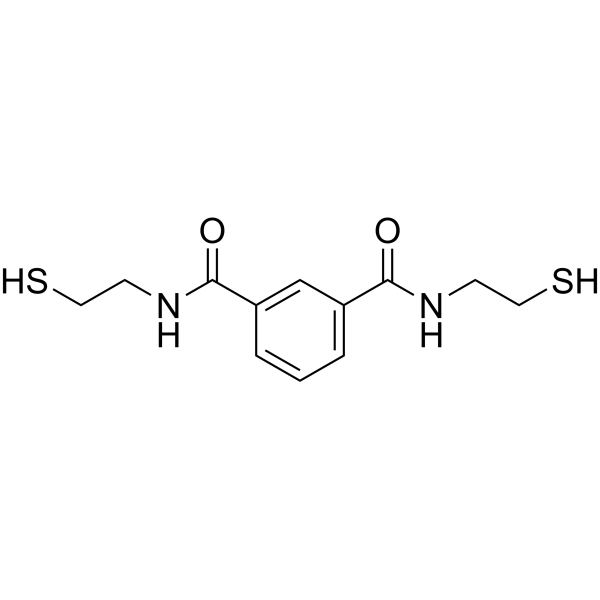
|
| DC8640 | 1-NM-PP1 Featured |
1-NM-PP1 is a cell permeable inhibitor of kinases that have been mutated, by a single base substitution, to become ‘analog sensitive’ (as), as compared to the wild-type kinase.
More description
|
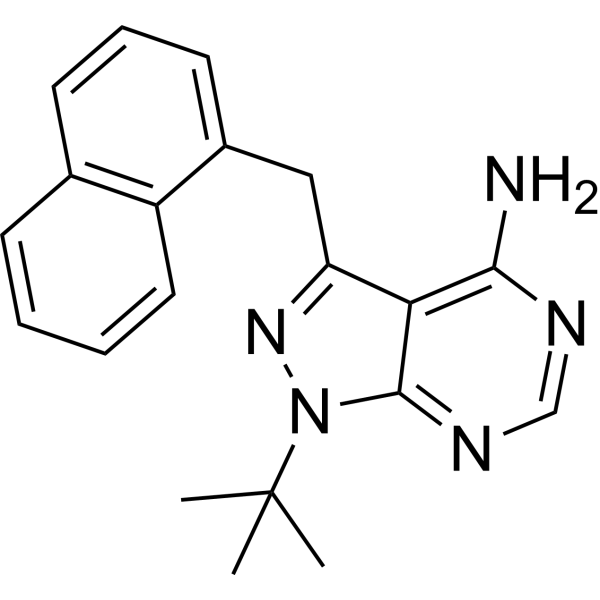
|
| DC73890 | 5M-8OH-Q Featured |
5M-8OH-Q is a specific small molecule inhibitor of UDP-glucose glycoprotein glucosyltransferase (UGGT), binds a CtUGGTGT24 “WY” conserved surface motif conserved across UGGTs (Kd=47 uM) but not present in other GT24 family glycosyltransferases.
More description
|
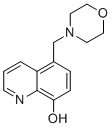
|
| DC11101 | Soticlestat Featured |
Soticlestat is a potent, selective cholesterol 24-hydroxylase inhibitor.
More description
|
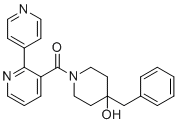
|
| DC21319 | ML 278 Featured |
ML278 is a potent and reversible inhibitor of lipid uptake via SR-BI (scavenger receptor BI) with IC50 of 6 nM.
More description
|
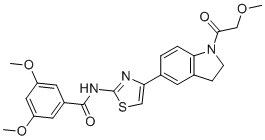
|
| DC74225 | YB-537 Featured |
YB-537 (YB537) is a potent, highly specific quinone reductase 2 (QR2) inhibitor with IC50 of 3 nM, shows no activity against QR1 (IC50>10 uM).
More description
|
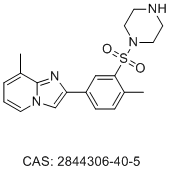
|
| DC10157 | PAβN dihydrochloride Featured |
PAβN dihydrochloride (MC-207110 dihydrochloride) is an efflux pump inhibitor.
More description
|

|
| DC74158 | S9-A13 Featured |
S9-A13 is a highly potent and specific inhibitor of SLC26A9, potently inhibits SLC26A9-mediated Cl−/I− and Cl−/SCN− exchange activities with IC50 of 90.9 and 171.5 nM, respectively.S9-A13 does not inhibit other members of the SLC26 family and has no effects on Cl− channels such as CFTR, TMEM16A, or VRAC.S9-A13 (0-1 uM ) inhibits SLC26A9 currents in a dose-dependent manner in HEK293 cells, but shows little effects on CFTR currents in HEK293 cells at the highest concentration (5 uM).S9-A13 has a minor effect on ion transport in human airway epithelial cells and mouse trachea, despite clear expression of SLC26A9 in the apical membrane of ciliated cells.
More description
|
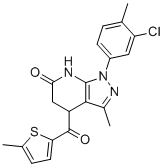
|
| DC20170 | Dapagliflozin propanediol monohydrate Featured |
Dapagliflozin propanediol belongs to the class of orally administered antidiabetic agents designated as sodiumglucose cotransporter 2 (SGLT2) inhibitors.
More description
|

|
| DC74161 | SAR439883 Featured |
SAR439883 (SAR 439883) is a novel potent, selective, orally active PKR inhibitor with IC50 of 0.68/0.69 uM against hPKR/mPKR, respectively.
More description
|
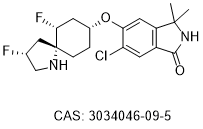
|
| DC22197 | PZ09(PKC-9) Featured |
PZ09 (PKC-zeta inhibitor 9, PKC-ζ inhibitor PZ9) is a potent, isoform selective PKC-zeta (PKC-ζ) inhibitor with IC50 of 5.18 nM, displays excellent selectivity (>200-fold) over other PKC isoforms with exception of PKC-i (10-fold). PZ09 also shows high selectivity for CDK-2 (>200-fold), as well as a broader range of other kinases (<50% inhibition at 10 uM). PZ09 is a small-molecule inhibitor, the first tool to successfully interrogate aPKC signaling in cells.
More description
|
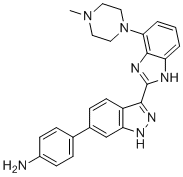
|
| DC10202 | AZD8797 Featured |
AZD8797 is an allosteric non-competitive modulator of the human CX3CR1 receptor; antagonizes CX3CL1 with IC50 values of 6 and 300 nM in B-lymphocyte cell line and human whole blood, respectively.
More description
|
|
| DCQ-017 | 3'-Hydroxypuerarin |
3'-Hydroxypuerarin is an isoflavone isolated from the roots of Pueraria lobata (Willd.) Ohwi. 3'-Hydroxypuerarin is a antioxidant, which shows marked ONOO(-), NO•, total ROS scavenging activities.
More description
|
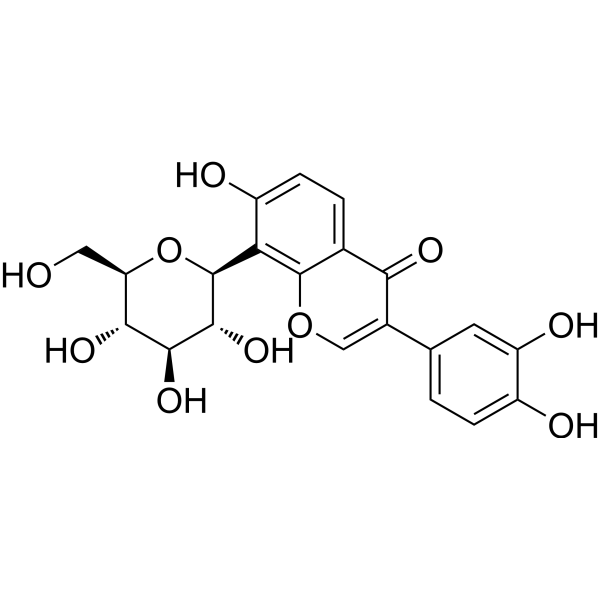
|
| DCG-040 | Polygalasaponin F |
Polygalasaponin F, an oleanane-type triterpenoid saponin extracted from Polygala japonica, decreases the release of the inflammatory cytokine tumor necrosis factor a (TNFa). Polygalasaponin F reduces neuroinflammatory cytokine secretion through the regulation of the TLR4-PI3K/AKT-NF-kB signaling pathway .
More description
|
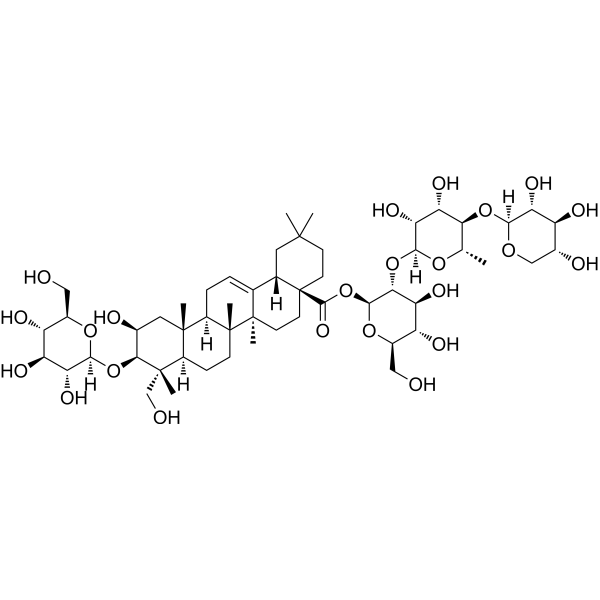
|
| DC20168 | 5'-Cytidylic acid; Cytidine monophosphate, Cytidine 5'-phosphate |
5'-Cytidylic acid is a nucleotide that is used as a monomer in RNA.
More description
|
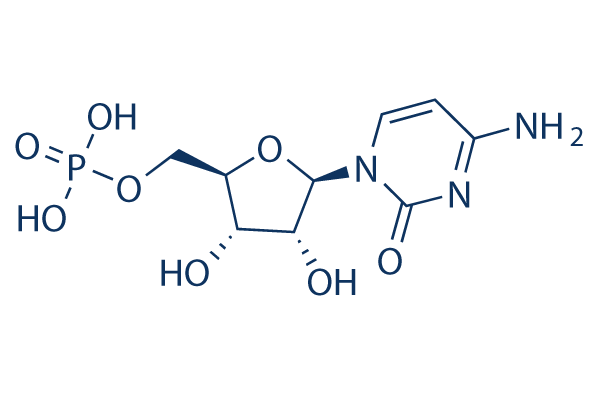
|
| DC36995 | Adrenochrome Featured |
Adrenochrome is a chemical compound produced by the oxidation of adrenaline (epinephrine). The derivative carbazochrome is a hemostatic medication.
More description
|
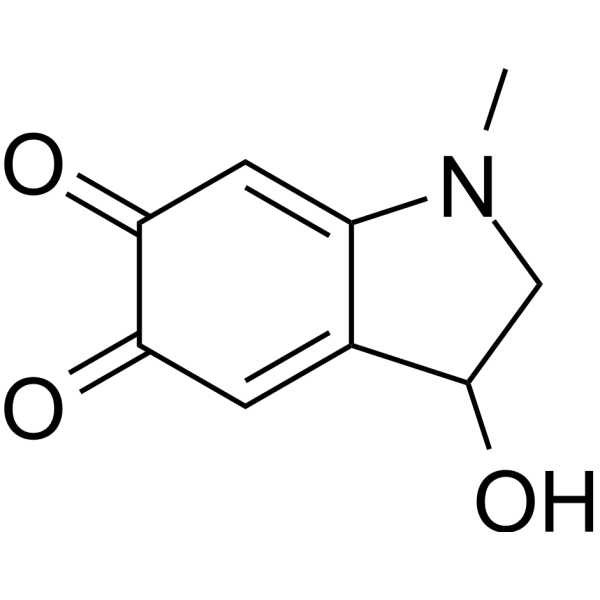
|
| DC23981 | BCX-1470 methanesulfonate Featured |
A serine protease inhibitor that inhibits the esterolytic activity of factor D (IC50=96 nM) and C1s (IC50=1.6 nM).
More description
|
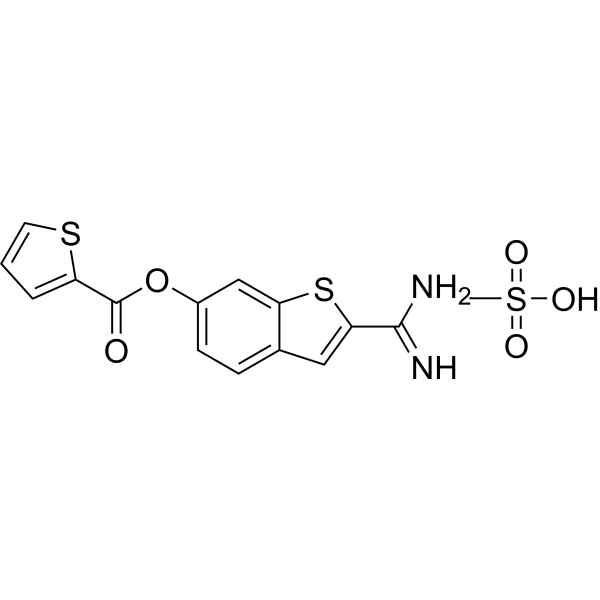
|
| DC10474 | GBT-440(Voxelotor) Featured |
GBT-440(Voxelotor) is a novel small molecule hemoglobin modifier which increases hemoglobin oxygen affinity.
More description
|

|
| DC20309 | ANTISAUVAGINE-30 Featured |
A potent, selective and competitive corticotropin-releasing factor CRF2 receptor antagonist with Ki of 1.4 nM, 100-fold selectiivity over CRF1.
More description
|

|
| DCAPI1056 | Nattokinase Featured |
Nattokinase, Natto fermentation is a potent fibrinolytic enzyme. Nattokinase can break down blood clots by directly hydrolyzing fibrin and plasmin substrate. Nattokinase can be used for the research of cardiovascular diseases.
More description
|
.png)
|
| DC32887 | NNC63-0532 Featured |
NNC63-0532 is a potent and selective non-peptide agonist of the NOP receptors.
More description
|
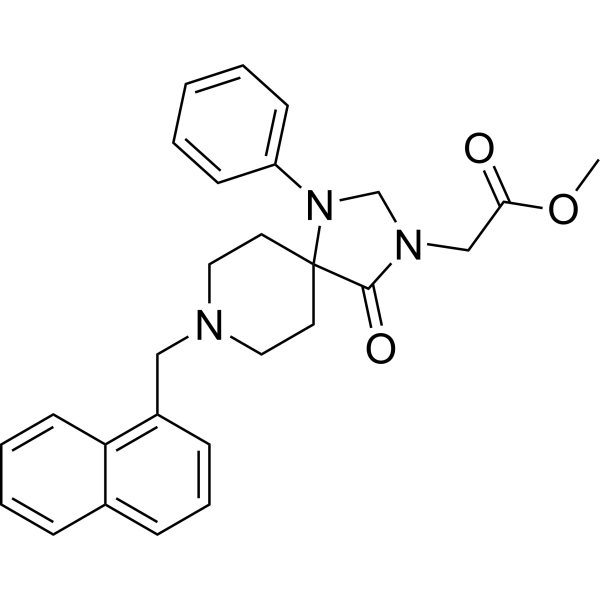
|
| DC26004 | delta-Valerobetaine (hydrobromide) Featured |
Delta-Valerobetaine (hydrobromide) is a precursor of trimethylamine N-oxide (TMAO).
More description
|
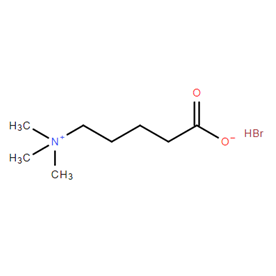
|
| DC23380 | TRIM24 inhibitor X Featured |
TRIM24 inhibitor X is a potent TRIM24 bromodomain inhibitor for synthesis dTRIM24..
More description
|
|
| DC22843 | DDX3-IN-16d Featured |
A small molecule inhibitor (IC50=0.3 uM) of DEAD-box polypeptide 3 (DDX3), a human host factor required for the replication of several DNA and RNA viruses.
More description
|
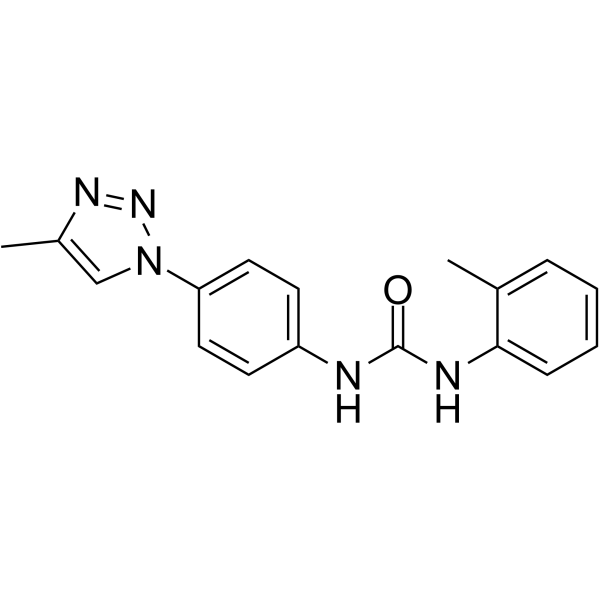
|
| DC74133 | PSB-CB-27 Featured |
PSB-CB-27 is a potent, selective antagonist of GPR18 with IC50 of 650 nM, shows no inhibition on GPR55 and low affinity for CB1/CB2 receptors.
More description
|

|
| DC74185 | SS-1-148 Featured |
SS-1-148 is a potent, selective inhibitor of human ornithine δ-aminotransferase (hOAT) with Ki of 60 uM, shows excellent selectivity over other related aminotransferases (e.g., GABA-AT).
More description
|

|
| DC12091 | AdipoRon hydrochloride Featured |
AdipoRon hydrochloride is an orally active and specific AdipoR agonist, binding to AdipoR1 and AdipoR2, with Kds of 1.8 and 3.1 μM, respectively.
More description
|
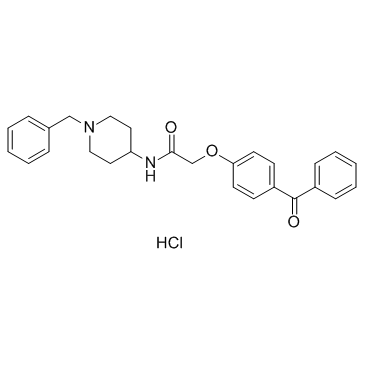
|
| DC7049 | AdipoRon Featured |
AdipoRon is a novel small-molecule AdipoR agonist; binds to both AdipoR1(Kd= 1.8 uM) and AdipoR2(Kd=3.1 uM).
More description
|
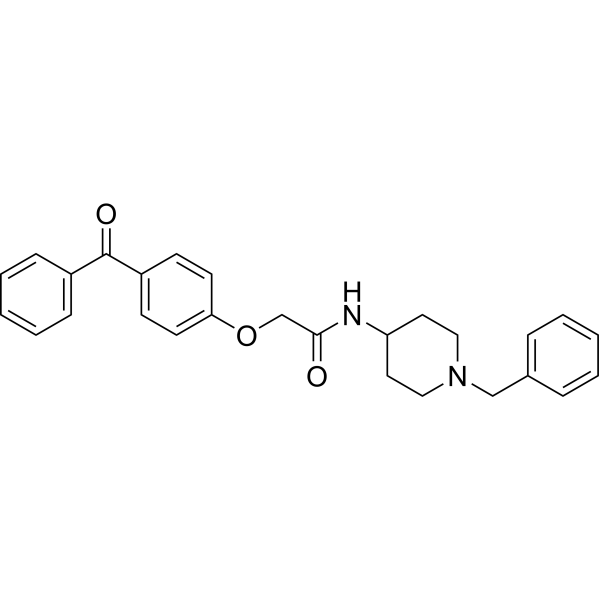
|